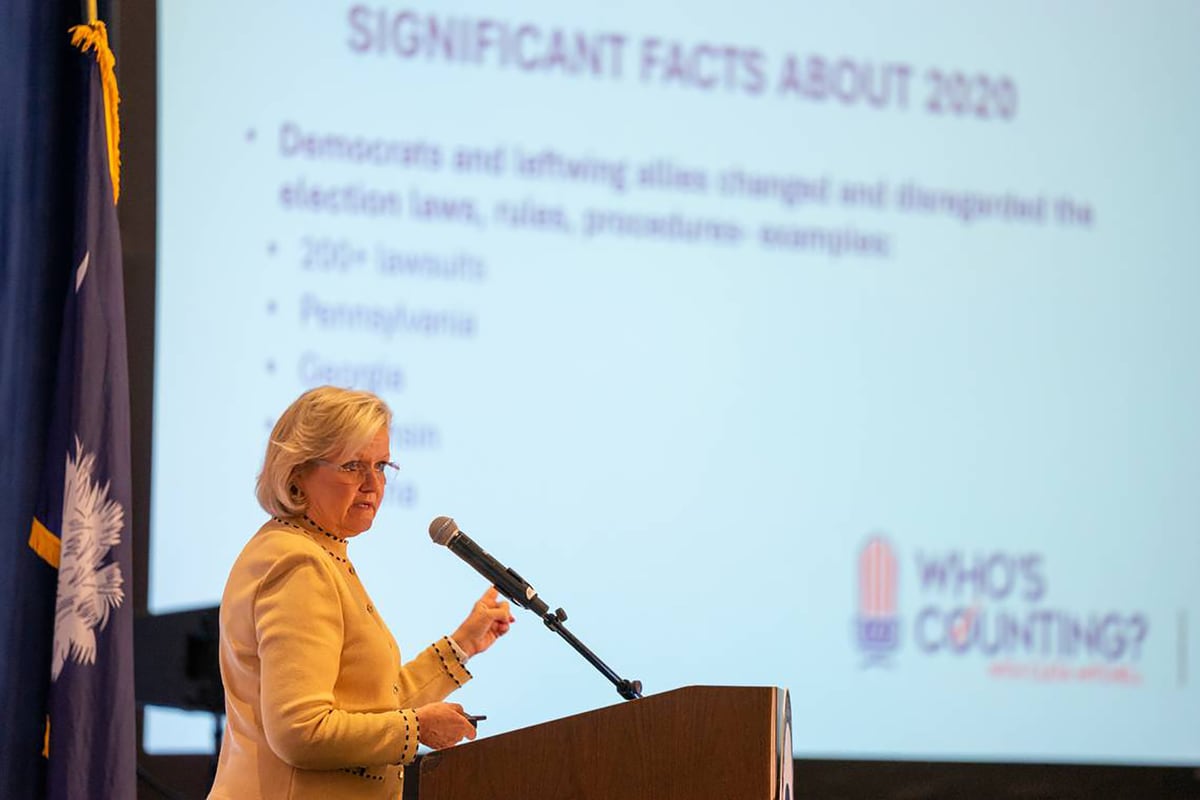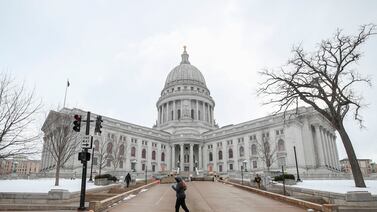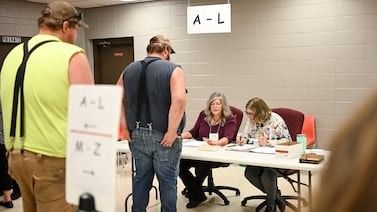Votebeat is a nonprofit news organization reporting on voting access and election administration across the U.S. A version of this post was originally distributed in Votebeat’s weekly newsletter. Sign up for our free newsletters here.
Good morning,
Longtime lawyer Cleta Mitchell, a leader in the conservative effort to shape election laws across the country, spoke to an audience of major GOP donors last month. She took direct aim at how easy it is for young people to vote, and she didn’t sound happy about it.
“They basically put the polling place next to the student dorm so they just have to roll out of bed, vote, and go back to bed,” she said at one point. She also took aim at the use of same-day voter registration by students in Michigan last fall. “There were hundreds of votes that were cast by students who were registered after the deadline, after the polls closed,” Mitchell alleged, adding, “but those ballots all still counted.”
Of course, the real state of play for student voters didn’t shape up quite as she makes it sound. For one thing, those Michigan students taking advantage of same-day registration had to wait in line for hours on Election Day in order to do so, until the wee hours of Wednesday morning — perhaps why some same-day registrations were processed after the polls had been scheduled to close, for students who had gotten in line well before that and thus were still allowed to vote.
The audio, obtained by a journalist, Lauren Windsor, captured Mitchell making a presentation titled “A Level Playing Field for 2024.” Mitchell runs the Election Integrity Network, and, the Washington Post reported, she repeatedly said the endeavor was not about winning campaigns and wasn’t partisan.
Nonetheless, she was pitching the assembled Republican donors for funding to carry out her plan, an effort her presentation said was necessary “for any candidate other than a leftist to have a chance to WIN in 2024.”
The audio has her repeatedly returning to the subject of college-aged voters, referring to polling places on college campuses in Wisconsin and noting key counties in certain states, such as Durham, in North Carolina, “where Duke University is.”
Her comments made news and drew criticism because she appeared to be advocating for reducing access for voters who tend to cast ballots for Democrats. As a separate Washington Post analysis pointed out, there are more polling places in senior centers, and Mitchell wasn’t complaining about those. But her remarks also are an opportunity to consider some of the very real barriers facing young voters, including restrictive voter identification laws — which Republicans are pushing for.
New research shows more than 11 million people between the ages of 18 and 29 didn’t have a driver’s license in 2020 — a potentially significant barrier, given that voter identification laws often have strict definitions of the type of identification that can be used to vote.
The research, from the nonprofit group VoteRiders, which focuses on voter identification, and the University of Maryland’s Center for Democracy and Civic Engagement, found 39% of those between 18 and 19 don’t have driver’s licenses. The research was conducted by analyzing data from the 2020 American National Election Studies and U.S. Census data estimates.
The percentage of voting-age students who did not have a current driver’s license was nearly twice as large as the percentage of non-students who didn’t have one, and the percentage of students who did not have any photo ID was around three times larger than the percentage of non-students who did not have any photo ID.
“We unfortunately have known for a long time the disproportionate impact voter identification laws have on low income and unhoused and black and brown communities,” said Lauren Kunis, CEO and executive director of VoteRiders, which helps voters obtain the identification they need to vote. “Not enough attention has been given to the disproportionate impact that they have on young and student voters.”
VoteRiders also tracks where voter ID laws are changing and which states accept student IDs (or some student IDs) in order to vote. In some states, the rules can be confusing. Arizona, for example, only accepts student identification issued by public universities. In Wisconsin, the student ID would have to meet specific criteria, such as including the student’s signature and expiring within two years of the issuance date (which also has to be shown on there).
Of course, voter identification laws vary widely from state to state, and some are more restrictive than others. Kunis points out it’s easy for lawmakers to write voter identification legislation calling for specific forms of identification and ruling out others, calling it “a strategic way to effectively cut some eligible voters out of the electorate.” One well-known example: A federal appeals court in 2016 struck down a voter identification law in North Carolina, finding it attempted to “target African-Americans with almost surgical precision” by restricting the use of types of identification disproportionately used by Black voters.
She points out that fewer young people are getting drivers licenses, and voter identification laws that preclude using student identification “specifically target the type of ID they are most likely to have.”
At a congressional hearing last week on confidence in elections, U.S. Rep. Terri Sewell, an Alabama Democrat, raised the same issue. “If my state chooses to accept the photo ID of a hunting license but not a student ID, is that fair?” she asked. “I would say no. I would say that you’re making it harder for students to vote.”
Back Then
I call your attention to a CBS broadcast from Nov. 3, 1964, in which Barry Goldwater’s presidential campaign is featured for beginning what was described as an “unprecedented” poll watching effort. Says the anchor: “Supporters of Sen. Goldwater mounted their ‘Operation Eagle Eye’ today to watch the polls, and Democrats in many cities were keeping an ‘eagle eye’ on the operation, suspecting it might be used to intimidate Democratic voters.”
New From Votebeat
From Votebeat Arizona: Cochise County ready to hire elections director who spread false claims of 2020 election rigging.
From Votebeat Arizona: Cochise County hires elections director who has spread election misinformation
From Votebeat Pennsylvania: Bill allowing counties to process mail ballots early clears first hurdle in Pa. House
From Votebeat Pennsylvania: Everything you need to know about voting in Philly’s 2023 primary election (and not just for mayor)
From Votebeat Pennsylvania: What would make it easier for you to vote in Philly?
From Votebeat Texas: Tarrant County faces big challenge in replacing elections chief amid contentious atmosphere
In Other Voting News
- In an unusual move, the North Carolina Supreme Court Friday reversed two significant voting rights decisions, on redistricting and voter identification, the News and Observer reported. The state Supreme Court also overturned a lower court decision restoring voting rights to people convicted of felonies who were out of prison, but still under state supervision. A previous configuration of the state Supreme Court had last year ruled that districts drawn by the Republican-dominated Legislature were unconstitutionally gerrymandered and had struck down a 2018 voter identification law, but the court, now with a conservative majority, reversed those decisions.
- I hope you are enjoying the Fox News drama, because it continues with Smartmatic. The cable news channel has agreed to hand over thousands of documents in relation to the $2.7 billion defamation lawsuit the small voting machine company filed against it. Smartmatic has accused Fox News of “slow rolling” document production in court filings.
- A panel of 11th Circuit judges this week dismissed a constitutional challenge to Alabama’s mail-in voter registration form. A non-profit had challenged the form in 2016 because it barred anyone convicted of a “crime of moral turpitude” from registering to vote. The 106-page opinion indicates the opinion was based partially on the wide support such a ban has within the state.
- The Florida Senate approved a massive elections bill this week that, in part, ensures Gov. Rick DeSantis does not have to resign to run for president and also bolsters his efforts to restrict the abilities of voter registration groups. It also shortens the amount of time voters have to mail in ballots. The bill now goes to the House.
- Just when you thought this newsletter was too depressing, I present Minnesota, where a recent AP headline reads, “Minnesota takes steps to make it even easier to vote.” The state will now allow 16- and 17-year-olds to preregister to vote, in a state where it is notably already pretty easy to vote.
- Shasta County, Calif., has taken its first real steps toward implementing hand counting in the county by adding five new staff members to the elections department. “It’s an irresponsible, terribly reckless decision on the part of this board—the majority of this board,” said Supervisor Mary Rickert, who offered a motion to restore the county’s contract with Dominion voting machines. The motion died for lack of a second.
- Roy Saltman, who issued a widely-ignored report in 1988 encouraging a ban on punch-card ballots, has died at the age of 90. He wrote the report while acting as the federal government’s top voting machine expert at the National Institute of Standards and Technology, 12 years before the 2000 election in which hanging chads caused such chaos. “It takes a crisis to move people, and it shouldn’t have,” he told USA Today in 2001.
Carrie Levine is Votebeat’s story editor and is based in Washington, D.C. She edits and frequently writes Votebeat’s national newsletter.Contact Carrie at clevine@votebeat.org.





